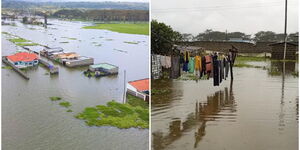Traders in Rongo are counting losses in millions of shillings after the Kenya National Highway Authority (KeNHA) on Wednesday, February 21, demolished temporary structures housing their businesses.
The operation was conducted in conjunction with the Migori County government, to clear businesses running close to the Rongo-Homabay highway, to facilitate road expansion.
The traders operating have blamed area leaders for not coming to their rescue. They highlighted that despite receiving notice of the demolitions, they were not provided with alternative options for their businesses.
One of the traders narrated having lost all his property, including chairs and tents for hire, noting that he never received any notice to move his property from the kiosks.
“I have seen wonders today, I have made losses, all my things have been taken away as scarp because it's all ruined,” one trader stated.
A widowed mother, pleading with the government, lamented the destruction of her sole means of livelihood and appealed for an alternative location for their business structures.
“Kiosks have been destroyed all over Rongo. I’m a widow this is where I get my income. I have kids that am taking care of, I want the government to tell me how they expect me to survive,” another trader stated.
“We request that the county gov’t relocate us, or at least give us an alternative for our business structure.”
In a similar incident last year in the Ndagani area in Chuka, the area chief Charles Njagi directed traders to remove unauthorized structures from road reserves, terming them as treacherous. Njagi also highlighted that these structures contributed to the high number of road accidents in the area.
“We have warned traders against building structures along the road several times, and if they refuse to vacate, we will have to remove them by force leading to unnecessary losses,” he cautioned.
The Kenya Roads (Roadside Stations) Regulations, 2023, draft proposed Ksh3,000 daily charges payable for traders to erect temporary structures on road reserves in Kenyan cities.
If approved, the temporary structures will attract up to Ksh100 for every square meter per day, translating to a minimum of Ksh3000 per day.
The charges will be channelled through the county governments, in addition to other charges imposed on traders and businesses within their jurisdictions.












